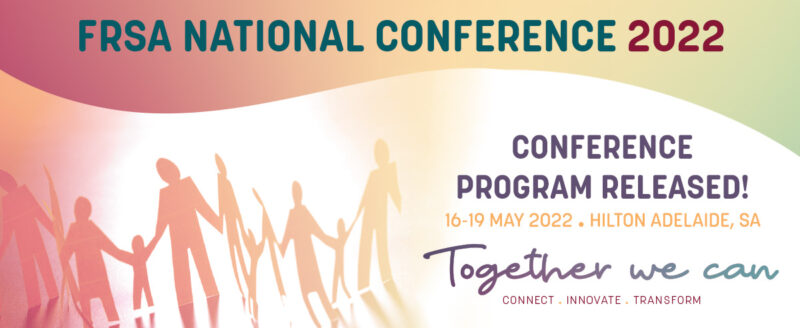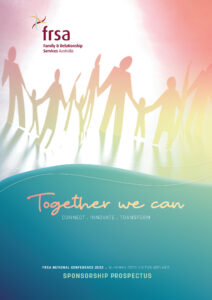
No. 2, 2022 | 23 February 2022
Go to:
From FRSA's Executive Director
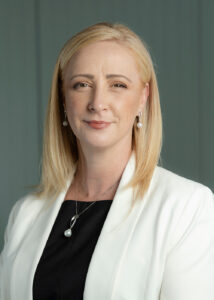
With all the mechanics of reduced restrictions, relaxed quarantining measures, and open borders – it is a welcome time for me to be able to release the program for the upcoming FRSA Conference being held in Adelaide, 16-19 May 2022.
We are delighted to have assembled such a strong concurrent session program around the theme Together we can: Connect, Innovate, Transform and can’t wait to bring the network together to share their experiences and learnings over the last few years. We attracted a record number of abstract submissions this year and are delighted that we are looking to set another record with an increased number of papers to be published in the FRSA e-Journal in 2022 – if all authors providing an expression of interest submit. Our special thanks to members of the Conference Reference Committee for their support and engagement through this particularly busy time.
Registrations are coming in strongly and conversations with people in the network clearly point to the fact that people are really keen to be meeting in person again.
We all know that technology has played a significant role in keeping us connected in the last few years, but the personal/interpersonal connection is something we are all craving. The role of technology in the delivery of services to children, families and communities over the last two years is reflected strongly in the conference program as people share their experiences and learnings.
At FRSA we are grateful to our members who engaged in a range of focus group conversations towards the end of last year, exploring in more depth the delivery of services via technology through the ‘safety’ and ‘suitability’ lenses. The research report capturing this information is nearing completion and we look forward to this report contributing to the FRSA Conference conversations at that time.
We are delighted to be able to offer a strong selection of presentations across all Conference streams. With the recent release of the Elder Abuse Prevalence Study in December 2021, it is particularly pleasing to be able to showcase our Members’ important work in this area.
Our Conference keynote speakers will be announced over the next week or so. Stay tuned!
We are extending the Early Bird rate by a week to 11 March – so please be sure to check out the program and register.
Kind regards,
Jackie Brady
FRSA Executive Director
FRSA’s new address!
Just a reminder that the FRSA National Office has moved, below is our new postal and office address to update your records:
✉️PO Box 326 Deakin West ACT 2600
📍Level 1, 3-4/36 Thesiger Court, Deakin ACT 2600
☎️ 02 6162 1811
Walk the Talk: Elder Abuse Conference 2022
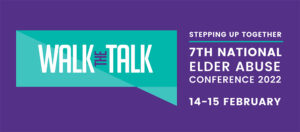 On 14 and 15 February, COTA Tasmania and Elder Abuse Action Australia hosted the seventh national elder abuse conference, Walk the Talk, in Hobart.
On 14 and 15 February, COTA Tasmania and Elder Abuse Action Australia hosted the seventh national elder abuse conference, Walk the Talk, in Hobart.
The conference invited dialogue, debate and reflections on ending the abuse and neglect of older people across the Australian community.
A number of FRSA members are currently involved in the government’s Elder Abuse Service Trials as well as providing other interventions – such as Elder Mediation, counselling, and case management support for those at risk or experiencing elder abuse – on an ongoing basis.
It was therefore wonderful to see so many FRSA member representatives sharing their experience and knowledge at the conference, covering topics such as the importance of solid data collection, ways in which older Australians experiencing or at risk of elder abuse were supported through COVID lockdowns and establishing strong working relationships with police and other agencies to respond to elder abuse.
The recently released National Elder Abuse Prevalence Study: Final Report found that the most common form of elder abuse is psychological abuse (11.7%), followed by neglect (2.9%), financial abuse (2.1%), physical abuse (1.8%) and sexual abuse (1%). The role of therapeutic as well as legal and health supports is therefore critical.
Age Discrimination Commissioner and Walk the Talk Ambassador, the Hon Dr Kay Patterson, reminded audience members that not only abuse but also the over-protection of older people can undermine their health, happiness and capacity for continued meaningful participation. She urged audience members not to let themselves become ‘invisible’ as they aged and left the audience with the memorable catchphrase: Old and bold.
Neighbour Day celebrates 20 years of connecting communities
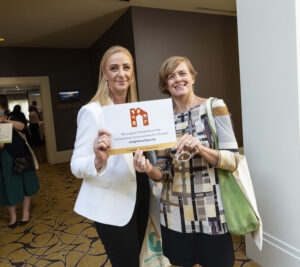
Each year Neighbour Day is held on the last Sunday in March, falling on 27 March this year. Neighbour Day is Relationships Australia’s social connection campaign. It aims to support and enable sustainable respectful relationships across communities, while also helping to address loneliness across the nation.
Neighbour Day was founded in Melbourne, Australia in March 2003 by community activist and social commentator, Andrew Heslop, after the remains of an elderly woman were found inside her suburban home – she died alone, forgotten by family, friends and neighbours. Relationships Australia has been the home of Neighbour Day since January 2014.
2022 marks the 20th anniversary of Neighbour Day and Relationships Australia held a breakfast event on 8 February to celebrate this achievement in connecting communities for 20 years. Parliamentary friends of Neighbour Day, Neighbour Day Ambassadors and Neighbour Day supporters joined together to share stories and a meal and listen to an inspiring line-up of speakers. After two years of the pandemic, being able to meet in person was truly a time of connection. It was also a poignant reminder of the social connections that may need to be forged or restored after social distancing restrictions and in some instances, disharmony, have forced families and neighbours apart.
To find out more about Neighbour Day and activities you can initiate to bring your neighbours together, visit the Neighbour Day website.
Marriage and Divorce in Australia

Child Family Community Australia has released the latest facts and figures on marriages and divorce in Australia.
These trends are primarily based on statistics published by the Australian Bureau of Statistics, though data from major Australian surveys are also used.
Figures around marriages in Australia include: marriage rate, age at first marriage, religious and civil weddings, and more. The latest data available shows that marriages have decreased by over 35% from 2019 to 2020. The impact of the COVID-19 pandemic on marriages in 2020 is also evident. Lockdowns and restrictions led to wedding cancellations and the postponement of wedding plans. Read the full publication.
 Figures around divorces in Australia included: divorce rate, duration of marriage at divorce, and the extent to which divorces involved children. While the crude divorce rate (divorces per 1,000 Australian residents) has been trending down since the 1990s. The lowest rate over the last half century was 1.9, recorded in 2016, 2019 and 2020. The largest proportion of couples separating and then divorcing were married for nine years or less. In 2020, 56% of separations and 41% of divorces were couples in this category. This showed little change from 2019. Read the full publication.
Figures around divorces in Australia included: divorce rate, duration of marriage at divorce, and the extent to which divorces involved children. While the crude divorce rate (divorces per 1,000 Australian residents) has been trending down since the 1990s. The lowest rate over the last half century was 1.9, recorded in 2016, 2019 and 2020. The largest proportion of couples separating and then divorcing were married for nine years or less. In 2020, 56% of separations and 41% of divorces were couples in this category. This showed little change from 2019. Read the full publication.
Reports on intimate partner homicide in Australia
Two ANROWS research reports launched at the 2022 ANROWS National Research Conference, ‘On the Agenda’, offer important insights on the dynamics of intimate partner homicides in Australia. The reports, which explore two separate data sets, look at the characteristics of these offences, the intimate partner relationships in the lead-up to these lethal incidents, as well as the life course trajectories of offenders prior to fatal violence.
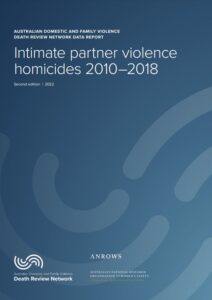 Intimate partner homicide is the most common form of homicide in Australia. Reflecting on the two reports, ANROWS CEO Padma Raman PSM said: “Both of these studies point to a great number of warning signs prior to fatal intimate partner violence. Together they address gaps in our understanding of how we should use this data on lethal violence against women to intervene before there is a homicide.”
Intimate partner homicide is the most common form of homicide in Australia. Reflecting on the two reports, ANROWS CEO Padma Raman PSM said: “Both of these studies point to a great number of warning signs prior to fatal intimate partner violence. Together they address gaps in our understanding of how we should use this data on lethal violence against women to intervene before there is a homicide.”
The first report, led by the Australian Domestic and Family Violence Death Review Network (the Network) and titled Australian Domestic and Family Violence Death Review Network Data Report: Intimate partner violence homicides 2010–2018, presents data from the 311 intimate partner violence-related homicides, both male- and female-perpetrated, that occurred in Australia between 2010 and 2018.
The second report, The “Pathways to intimate partner homicide” project: Key stages and events in male-perpetrated intimate partner homicide in Australia, explores the pathways leading up to homicide. In their analysis of almost 200 cases of male-perpetrated intimate partner homicide, researchers at the Australian Institute of Criminology (AIC) searched for factors that emerged at different points in the lives of homicide offenders and during their relationship with victims that may have increased the risk of lethal violence, and potential points of intervention.
As well as the two reports, facts sheets and more information about the two projects are available on the ANROWS website.
FRSA National Conference 2022 - PROGRAM RELEASED!
FRSA is excited to announce the release of the program for the FRSA National Conference 2022! This year’s program will focus on the theme “Together We Can: Connect, Innovate, Transform” and the three day event aims to deliver the knowledge, insights and the unique learnings and adaption brought from the COVID-19 pandemic experience over the last two years.
We have 70 half hour sessions and five 90 minute symposiums. We received a record number of abstract submissions and the standards of abstracts for this year’s conference was extremely high, with a lot of competition. We have been working hard to ensure the program captures the great expectations of FRSA Conference attendees. We have also left plenty of time for networking and we are putting the final touches to our Conference Gala Dinner that will certainly deliver a memorable experience after not being able to meet together face to face for two years.
Click below to view or download the PDF program. Click on the session titles for more details.
Don’t forget early bird rates end on 11 March 2022! So join us for this not to be missed event in Adelaide.
Stay up to date on Conference news by subscribing to our Conference and Forum Updates.
Sponsorship has always been a big part of FRSA’s Conferences and in acknowledgement of this support, we have a range of new packages for our 2022 Conference which we have designed to allow for maximum visibility to showcase the work and activity of your organisation/business. It will enable you to engage, discuss challenges and present solutions to FRSA Conference delegates.
We welcome your support of the Conference and hope that you will take advantage of the opportunities available to you in joining with FRSA as a Conference 2022 sponsor.
If you are interested in a more bespoke package for your organisation, outside what is outlined in our Sponsorship Prospectus, do not hesitate to get in touch with the FRSA team at admin@frsa.org.au or on (02) 6162 1811.

Consultation on new family dispute resolution services for Aboriginal and Torres Strait Islander families
The Government’s first Implementation Plan under the National Agreement on Closing the Gap included an announcement for funding of $8.3 million over 3 years to establish culturally safe and appropriate family dispute resolution for Aboriginal and Torres Strait Islander families. The funding will support selected Aboriginal Community Controlled Organisations (ACCOs) to train and/or employ Family Dispute Resolution practitioners.
The Attorney-General’s Department is working to determine how the new program could best operate and meet the needs of communities. A discussion paper and further information is available online via the Attorney-General’s Department website.
The department is seeking ideas and feedback from all interested stakeholders, and invites you to share your input. Contributions can be provided online via this link, or by emailing FamilyLawServices@ag.gov.au. You can also email FamilyLawServices@ag.gov.au to arrange a time to provide verbal feedback, express interest in attending an online workshop, or with any questions or comments.
Following this consultation process, a grant round is anticipated to open to eligible service providers in mid 2022 and for grant agreements to be in place with service providers by January 2023.
The consultation will run until 25 March 2022.

Support boost for young people exiting out-of-home care
 Centacare Catholic Family Services has partnered with community housing provider Housing Choices Australia (HCA) and Aboriginal Sobriety Group on a new project to prevent young people falling into homelessness after exiting out-of-home care.
Centacare Catholic Family Services has partnered with community housing provider Housing Choices Australia (HCA) and Aboriginal Sobriety Group on a new project to prevent young people falling into homelessness after exiting out-of-home care.
The $2.7 million Next Steps pilot will provide young adults aged between 17 to 21 years on long-term guardianship orders with a direct pathway into low cost accommodation across metropolitan Adelaide.
A multidisciplinary trauma-informed care team will support participants to maintain tenancy and address complex challenges in their lives as they transition to independence.
Centacare will provide wraparound support through therapeutic case workers, a financial counsellor, clinical nurse, and youth workers. Linked into this team will be a dedicated youth tenancy officer based at HCA.
“The model recognises that for many young people leaving care, early relationship templates can remain an unhelpful influence in their transition to adulthood, and many young people’s journey through the care system may not provide opportunities to address these influences therapeutically,’’ Megan said.
“Centacare believes that integrating therapeutic principles will provide the best opportunity for young people to overcome these challenges and maximise their potential.’’ Read more.
OzChild’s TFCO-A program receives certification
 OzChild’s Treatment Foster Care Oregon – Adolescent (TFCO-A) team in New South Wales has recently received certification from Treatment Foster Care Consultants Inc in Eugene Oregon. They are the first TFCO-A Team to be certified in Australia.
OzChild’s Treatment Foster Care Oregon – Adolescent (TFCO-A) team in New South Wales has recently received certification from Treatment Foster Care Consultants Inc in Eugene Oregon. They are the first TFCO-A Team to be certified in Australia.
The Certification process assesses a program’s ability to implement the model as recommended and maintain adherence to the model over time, confirming that OzChild’s Treatment Foster Care Oregon – Adolescent program meets model fidelity standards and produces treatment outcomes that are like those of the model program as measured in the scientific evaluations that have been conducted of the model.
“I am excited for what 2022 will bring for TFCO-A through the teams continuing work and am incredibly proud of the difference they are making for young people in New South Wales,” said Michelle Van Doorn, OzChild’s Executive Director Services & Practice. Read more.

Child Wellbeing and COVID: National Survey
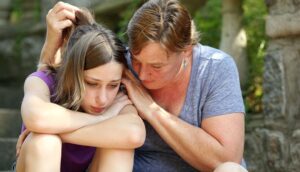 Australia’s National Children’s Commissioner wants to hear from children and their families about how living through the past two years of COVID-19 has affected their mental health and wellbeing.
Australia’s National Children’s Commissioner wants to hear from children and their families about how living through the past two years of COVID-19 has affected their mental health and wellbeing.
They are surveying children and young people aged nine to seventeen to find out more about the unique challenges they have faced over the past two years and the social, emotional, educational, and other impacts they have experienced.
They are also surveying parents, carers and grandparents about their children’s experiences during COVID, as well as how they have coped with parenting challenges during this time.
Access the surveys below:
The surveys will help to inform the support services that children and their families need as we continue to deal with the pandemic, and as we emerge from it.
Free online training for not-for-profit organisations from Senate Procedure and Research Section
The Senate Procedure and Research Section has recently launched free, online training sessions for not-for-profit organisations interested in the functions and operations of the Senate. Three sessions are being offered in 2022:
- Introduction to how the Senate works, 24 February 10:00am – 12:00pm (AEST)
- Introduction to Senate committees, 25 May 10:00am – 12:00pm (AEST)
- Introduction to the legislative process, 10 November 10:00am – 12:00pm (AEST)
These online training sessions are presented by Senate staff and are designed to help you as a representative of a not-for-profit organisation to increase your understanding of the role and functions of the Senate. The training is practical and focuses on engagement with the Senate including the committee inquiry process as well as understanding the legislative process.
For further information, including how to register, please visit our Senate training webpage.
If you have any questions about this training, you can email senate.training@aph.gov.au or phone 02 6277 3662.
Effective Online Group Leadership Workshop
SUNSHINE CIRCLES – Albury
SUNSHINE CIRCLES – Shepparton
HEY LITTLE WARRIOR – Sale
NT
Family Dispute Practitioner & Family Law Pathways Project Officer (Full or PT) | Relationships Australia NT
Family Dispute Resolution Practitioner (Full Time or Part Time) | Relationships Australia NT
Child and Family Counsellor | Anglicare NT
Aboriginal Family Worker | Anglicare NT
VIC
General Manager Clinical Services | Relationships Australia Victoria
Centre Manager | Relationships Australia Victoria
Program Facilitator | Relationships Australia Victoria
Family Dispute Resolution Practitioner – Traralgon | Relationships Australia Victoria
Case Manager Family Violence | Relationships Australia Victoria
If you have any events you’d like listed on the FRSA Events and Training Calendar or job vacancies you’d like listed on the FRSA Jobs Board, email Communications Officer, Vanessa Lam at communications@frsa.org.au. Please note that posting onto the FRSA website is reserved for FRSA Members only.

Ending homelessness in Australia: an evidence and policy deep dive | Centre for Social Impact
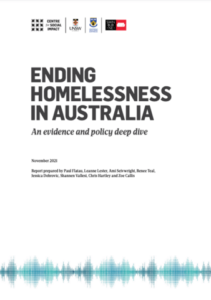 This report contributes to the research and evidence base for ending homelessness using an ending homelessness model built around addressing drivers of homelessness, meeting the direct needs of those experiencing homelessness, increasing the supply of social and affordable housing and supporting the enabling environment.
This report contributes to the research and evidence base for ending homelessness using an ending homelessness model built around addressing drivers of homelessness, meeting the direct needs of those experiencing homelessness, increasing the supply of social and affordable housing and supporting the enabling environment.
COVID-19 practices and perceptions in Australia (2020-2021) | RMIT University
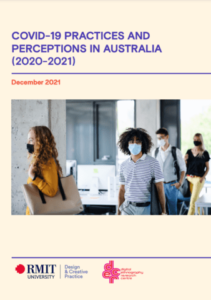 This research project investigated the impacts of the COVID-19 pandemic on people living in Australia, with a particular focus on their experiences, perceptions and practices—especially in terms of tracking technologies (the COVIDSafe app, the use of QR codes), masks and other prosocial techniques.
This research project investigated the impacts of the COVID-19 pandemic on people living in Australia, with a particular focus on their experiences, perceptions and practices—especially in terms of tracking technologies (the COVIDSafe app, the use of QR codes), masks and other prosocial techniques.
Mind the gap: parental awareness of children’s exposure to risks online | Office of the eSafety Commissioner
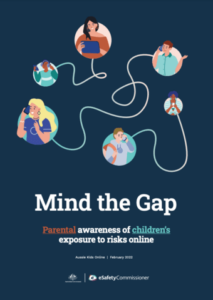 This research explores the opportunities and risks that the internet presents for children in Australia. More than 3,500 young people aged 8 to 17, and their parents, were surveyed during August and September 2021.
This research explores the opportunities and risks that the internet presents for children in Australia. More than 3,500 young people aged 8 to 17, and their parents, were surveyed during August and September 2021.
Upskilling and reskilling: the impact of the COVID-19 pandemic on employers and their training choices | National Centre for Vocational Education Research
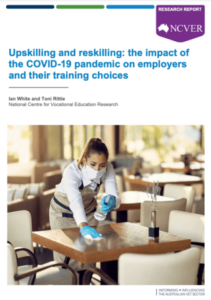 The challenge for the vocational education and training (VET) system in Australia will be to ensure that it continues to adapt and innovate its services in a responsive way – one that meets employer skill needs. The findings in this report indicate that a sizeable proportion of businesses are now looking to training to help them to recover and grow in the post-pandemic economy.
The challenge for the vocational education and training (VET) system in Australia will be to ensure that it continues to adapt and innovate its services in a responsive way – one that meets employer skill needs. The findings in this report indicate that a sizeable proportion of businesses are now looking to training to help them to recover and grow in the post-pandemic economy.
Glossary of terms used by some sex predators to groom children | Australian Federal Police
The AFP has released a glossary of acronyms and emojis that can be used by child predators who engage in sexualised communication online and via text message.
The glossary has been developed from information contained in investigations and reports undertaken by the AFP-led Australian Centre to Counter Child Exploitation (ACCCE) and AFP child protection teams across Australia.
Inclusive communication with LGBTIQ+ clients | Child Family Community Australia
CFCA has released their first evidence to practice guide outlines why inclusive communication matters and what works to ensure inclusive communication with LGBTIQ+ clients.
Evidence to practice guides were designed to equip practitioners with relevant and practical examples to support their work.
The prevalence of loneliness across 113 countries: systematic review and meta-analysis| University of Sydney
Loneliness at a problematic level is widespread in many countries, finds a University of Sydney led analysis of evidence from 2000 to 2019 across 113 countries and territories.
The findings identified important data gaps, particularly in low- and middle-income countries, and substantial geographical variation in loneliness, with northern European countries consistently showing lower levels compared with other regions.
Supporting children with neurodiversity | Child Family Community Australia
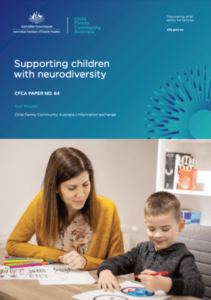 Neurodiversity is an umbrella term that refers to the diversity in brain functioning associated with a range of developmental conditions and experiences. This paper provides an overview of principles and strategies that can help practitioners to support children with neurodiversity to engage in counselling and reflective learning.
Neurodiversity is an umbrella term that refers to the diversity in brain functioning associated with a range of developmental conditions and experiences. This paper provides an overview of principles and strategies that can help practitioners to support children with neurodiversity to engage in counselling and reflective learning.
Changing the landscape: a national resource to prevent violence against women and girls with disabilities | Our Watch
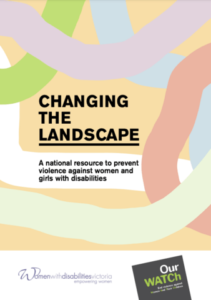 Violence against women and girls with disabilities is a serious and preventable violation of human rights. This resource is relevant to anyone involved in policy development or program funding, design, planning or implementation, and those working ‘on the ground.’
Violence against women and girls with disabilities is a serious and preventable violation of human rights. This resource is relevant to anyone involved in policy development or program funding, design, planning or implementation, and those working ‘on the ground.’
Settlement interrupted: the lasting impact of the COVID-19 pandemic on newly arrived young people in Victoria | Centre for Multicultural Youth
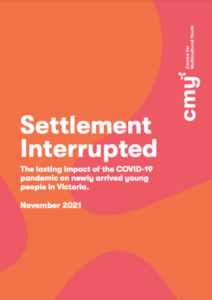 This report illustrates how the extended lockdowns of 2020 and 2021, and the broader pandemic, have presented significant interruptions to the settlement process, with implications for young people’s longer-term participation and wellbeing.
This report illustrates how the extended lockdowns of 2020 and 2021, and the broader pandemic, have presented significant interruptions to the settlement process, with implications for young people’s longer-term participation and wellbeing.
Want to submit something to the FRSA eBulletin?
If you have an news item or event that you would like to be featured in a future eBulletin please submit your announcement via the form below or email communications@frsa.org.au with the subject “FRSA eBulletin submission”.
Please note FRSA members receive priority for items posted in the eBulletin. And to keep information current, relevant and useful, submissions will not be repeated from week to week.
Subscribe
Subscribe to receive future eBulletin editions directly to your inbox!




